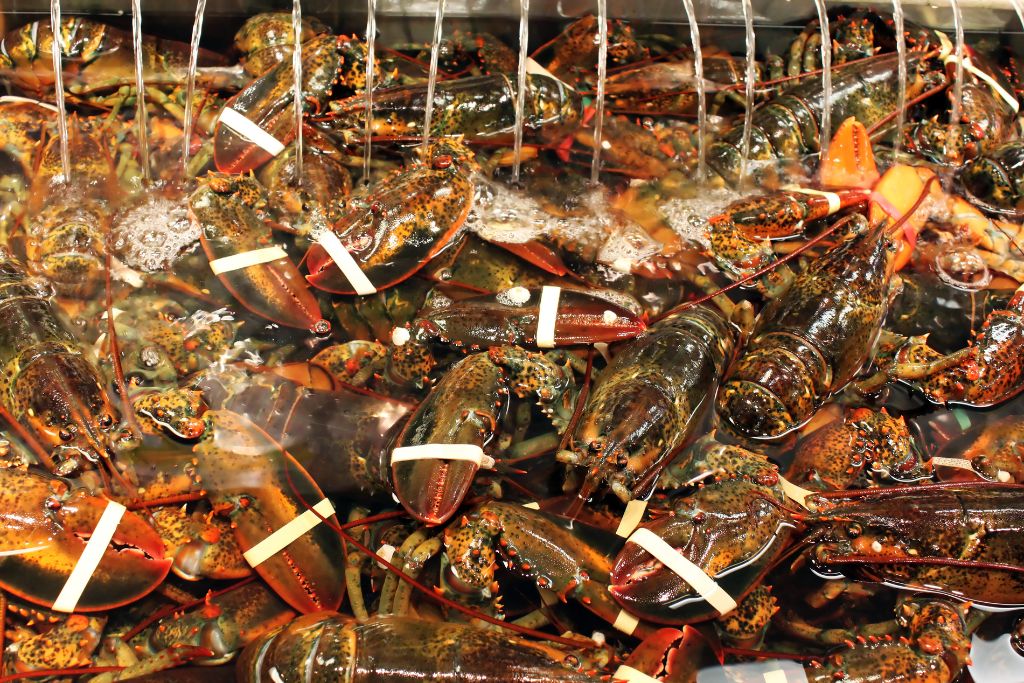The Maine lobster industry’s latest move in its ongoing battle for its financial survival is a lawsuit against the Monterey Bay Aquarium. The industry claims a downgrade in the Aquarium’s rating of lobster caught in Canada and Maine is defamatory and denies that they are culpable in sustainability issues involving the North Atlantic right whale.
—
California Aquarium Accused of Harming Lobster
Maine’s lobster industry has sued California’s Monterey Bay Aquarium, more precisely their Seafood Watch programme, because of a downgraded rating for lobster caught in Canada and Maine.
On a second front, Maine’s legislators have targeted bills against businesses like Whole Foods for following Seafood Watch’s recommendation to avoid purchasing lobster caught in Maine.
The Maine lobster industry representatives argue that its fishery has a long tradition of resource stewardship and they deny culpability in the entanglement of North Atlantic right whales. They further contend that there has not been a documented case of a right whale becoming entangled in fishing gear in Maine since 2004. The lobster industry is adamant that there is no justification for the restrictions that the National Oceanic and Atmospheric Administration (NOAA) imposed in 2021.
NOAA restrictions aimed to ban the traditional rope-and-buoy lobstering method in specially designated areas in Maine during the months of October through January. Maine’s lobster fishery was granted a 6-year delay from NOAA’s fishing regulations earlier this year. The reprieve came about by text included in a US$1.7 trillion federal spending bill.
Maine’s Governor Janet Mills joined by US Senators Angus King, and Susan Collins in offering solid support to Maine’s lobster fishery. There is no argument that the state’s economy and identity are deeply entwined with lobsters.
In 2021, the state of Maine valued the lobster harvest at nearly $725 million. Local politicians fear that the financial costs of restrictions on current fishing practices will result in significant financial harm to the industry.
The legal wrangling between lobster and whale advocates expanded when Maine Lobstermen’s Association, the Maine Coast Fishermen’s Association, and three Maine-based businesses filed a lawsuit against Monterey Bay Aquarium’s Seafood Watch.
The California aquarium’s Seafood Watch is a 20-year-old programme that assesses the sustainability of most of the seafood sold on the US and Canadian markets. In 2022, Seafood Watch downgraded its rating for lobster caught in Canada and Maine from yellow to red. The latter indicates that seafood purchases and consumption should be avoided.
According to Seafood Watch, “this fishery poses a risk to overfished or at-risk species, including endangered North Atlantic right whales. Entanglement in fishing gear is the leading cause of serious injury and death to North Atlantic right whales [and] current management measures do not go far enough to mitigate entanglement risks and promote recovery of the species.”
The lawsuit accuses Seafood Watch of making “false and defamatory statements about Maine lobster fishing practices and for misleading consumers and commercial lobster buyers about the integrity of the Maine lobster harvest.” The plaintiffs contend that they have lost business as a result of Seafood Watch’s downgrade. The legal action also demands that Seafood Watch remove and retract all defamatory statements.
You might also like: Off and On Again Protections: Will the North Atlantic Right Whale Survive the Legal Wrangling?
Seafood Watch was reported to comment that the lawsuit lacks merit. Credence is given to this argument from data published in October 2021 by the New England Aquarium. That data indicated that 86% of known right whales bore scars on their bodies. These scars show that whales have at some point in their life become entangled with fishing gear. Even when whales do not die as a direct result of entanglement, their health, reproductive success, and ultimately their long-term survival is negatively affected.
The population of North Atlantic right whales is currently estimated to be fewer than 340, and only about 70 are thought to be breeding females. This estimate represents a considerable decline from 2011 when the population was estimated at around 480. National Oceanic and Atmospheric Administration (NOAA) determined that for the North Atlantic right whale to recover, less than one whale per year can be seriously injured or killed; however, mortalities “from fishing entanglement occur at levels five times higher than the species can withstand.”
Seafood Watch argues that the lawsuit ignores “the extensive evidence that this fishery poses a serious risk to the survival of the endangered North Atlantic right whale, and they seek to curtail the First Amendment rights of a beloved institution that educates the public about the importance of a healthy ocean.”
Lobsters Take on Whole Foods
Monterey Bay Aquarium’s Seafood Watch is not the only entity to feel the ire of Maine’s lobster industry and its supporters.
In February of this year, Maine’s Republican lawmakers unveiled bills that, among other things, would expand state control of coastal waters and fund the industry’s legal battle to overturn federal fishing restrictions. Another aim of the proposed legislation was designed to punish Whole Foods, an upscale grocery chain.
There is only one Whole Foods store in Maine, located in Portland, because the market stopped selling lobster after Seafood Watch’s rating assessment indicated that consumers should avoid purchasing Maine lobster.
Senate Minority Leader Trey Stewart expressed support for the bill, stating that Maine “shouldn’t be giving tax breaks and using Maine’s tax system to aid any organization attempting to undercut any key industry in Maine.”
Other legislators called for the boycott of companies like Blue Apron and Hello Fresh in the event they remove lobsters from their meal offerings.
These punitive legislative measures have received backlash from members of Maine’s legislature and from the business community. President Curtis Picard of the Retail Association of Maine expressed concern that the bill could have unintended consequences. Picard argued that “it should be up to the consumer, not the government, to decide whether to punish Whole Foods for its boycott – perhaps with a boycott of their own.”
What’s Next?
The back and forth between lobster supporters and North Atlantic right whale interests shows no sign of abatement.
It is as yet unknown how the judge will rule on the lobster industry’s defamation suit against Seafood Watch or how the court of public opinion will react. The industry is likely to continue its stance as long as it believes it represents a threat to its financial survival. At the same time, the North Atlantic right survival appears to become more tenuous with each new entanglement.
You might also like: Saving the Endangered North Atlantic Right Whale and the Maine Lobster Industry


















